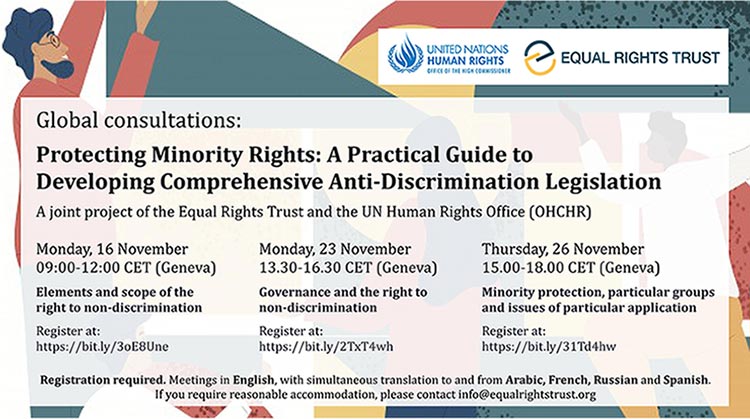Consultation meetings: Protecting Minority Rights - A Practical Guide to Developing Comprehensive Anti-Discrimination Legislation

The United Nations Human Rights Office Indigenous Peoples and Minorities Section (OHCHR IPMS) and the Equal Rights Trust (ERT) convene consultation meetings towards inputting the draft guide “Protecting Minority Rights: A Practical Guide on Developing Comprehensive Anti-Discrimination Legislation”.
The meetings are divide thematically into six 80-minute sessions, as follows:
- Elements and Scope of the Right to be Protected from all Forms of Discrimination
https://us02web.zoom.us/meeting/register/tZErc-iuqD4uHtKvttyjRhy-okf3_RCAfYP5 - Session 1: Forms of Discrimination: Proscribed Acts and Omissions
- Session 2: The Right to Effective Remedy
16 November 2020 (Monday), 9:00-12:00 CET (Geneva time):
- Governance and the Right to be Protected from all Forms of Discrimination
https://us02web.zoom.us/meeting/register/tZwpdeCppzsoHdeUUYFp0m1FfILvcdGQLJy1 - Session 3: Positive Action
- Session 4: Equality Bodies: A Global Idea?
- 23 November 2020 (Monday), 13:30-16:30 CET (Geneva time)
- Minority Protection, Particular Groups and Other Issues of Particular Application
https://us02web.zoom.us/meeting/register/tZAkdeutqz0oGtXwt7aUpPgqLSEgw3UY-d8c - Session 5: Minority Protection, Particular Groups and Other Issues of Particular Application
- Session 6: Open session (no pre-determined theme)
26 November 2020 (Thursday), 15:00-18:00 CET (Geneva time)
The meetings will be held in English, with translation to and from Arabic, French, Russian and Spanish provided. Registration links for each session are provided above.
Please Note: Although these meetings are open to the public, pre-registration is required for each session, and the organisers reserve the right to limit participation to not more than 100 persons per session.
Background
During 2020 and 2021, the United Nations Human Rights Office Indigenous Peoples and Minorities Section (OHCHR IPMS) and the Equal Rights Trust (ERT) are developing and producing “Protecting Minority Rights: A Practical Guide on Developing Comprehensive Anti-Discrimination Legislation”. The publication aims to fill a long-term expressed and identified need for a go-to manual for Governments, Parliaments, NHRIs, UN staff, civil society representatives and minority and other human rights defenders in the main conceptual and content elements of anti-discrimination law, the various aspects of the comprehensive ban on all forms of discrimination and the protection of minorities, as grounded in the core international human rights treaties and related norms and standards, including as adjudicated. In addition to summarizing normative content, the publication will provide concrete country-based practices and practical guidance.
The Guide is a response to the dramatically heightened recommendations in this area in the recent period appearing in the Universal Periodic Review (Human Rights Council) from and to all regions of the world, as well as increasing convergence among the Human Rights Treaty Bodies on the need for comprehensive anti-discrimination law addressing all grounds. The Guide thus aims to meet guidance needs in this area arising from the recommendations of international human rights mechanisms, as concerns transposing the international law ban on discrimination into the domestic legal order, in particular as concerns minorities, with due regard to intersectionality. While the publication is a response to these long-term needs, the COVID-19 crisis – and in particular the dramatic disparities reported world-wide as concerns impact on minorities – provides additional urgency to production of the publication.
The project partners are particularly interested in hearing the views of minorities and of other groups particularly affected or threatened with discrimination.
The consultation meetings will aim to present and discuss various aspects of comprehensive anti-discrimination laws, including concepts and dilemmas arising in the course of drafting, with a view to hearing opinions of relevant affected groups.